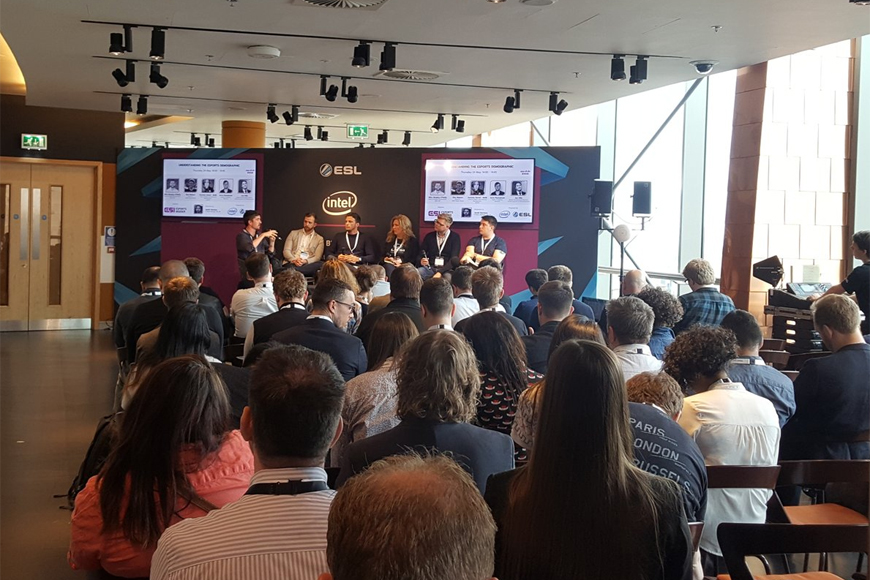Craig Robinson provides a recap of the ESI Birmingham esports business conference which took place ahead of the UK’s first ESL One Dota 2 Major.
1. How self-belief and taking the initiative can boost your esports career
The first panel on ‘community, the lifeblood of all things gaming’, featured Chris Archambault from Jagex, Chris Murphy from Square Enix, Jon Winkle from epic.LAN, Jorien van der Heijdan (aka Sheever) who casts Dota 2, Jonathan Tilbury from National Student Esports and Heather Dower moderating the panel from ESL UK.
The general theme of the panel was talking about the power and responsibility of esports/gaming communities.
Archambault said Jagex are well connected with their community through understanding the demand of Old School Runescape and then patching stuff into the game that the community voted on, while other panellists echoed this sentiment with their respective communities and the importance of fostering it.
The point that connected with us perhaps the most was from Square Enix’s Chris Murphy. As a volunteer, his words of ‘just do it’ struck home.
Lots of the esports gaming community start off as volunteers, who can then progress and make a career out of it. That’s something Chris did himself – he saw it was important to volunteer, make demos and other content, and use forums to receive feedback and improve. If you want to work in a specific area, just do what you can to help get you there. Start volunteering in that field and go from there.
2. The UK is proving it can be a force in esports
During the keynote from ESL and Intel, ESL UK’s managing director James Dean and Intel UK’s client marketing manager Mark Broom spoke in great detail about esports, where it’s come from and where it’s going, as well as highlighting some impressive videos and developments in the industry, including Intel Extreme Masters, their new VR tournament and more.
James stated that the suggestion of Birmingham becoming an ESL One major host was met with an unimpressed ESL HQ. However, James and the rest of the staff and support behind the Birmingham venue soon proved them wrong by selling 6,000 tickets in the first two hours of them going on sale – then climbing to 8,000 within 24 hours.
James also told us that he hopes the ESL UK & Ireland Premiership will surpass the German Premiership this year in terms of viewership.
3. The West Midlands has its eyes on esports
During the panel on UK esports featuring Ian Congdon from the NEC group, Dan Wood from Ukie, Ben Woodward from Code Red Esports, Dr Florian Block from the University of York and Roy Meredith from the West Midlands Growth Company.
This panel helped to expand our knowledge of what makes the West Midlands a decent destination for esports in the UK.
Ben Woodward also informed us all that his agency Code Red, of which he is a co-founder, is based in Birmingham and hires from the local area.
That’s not to mention the Insomnia, EGX, Dota major and other events that feature esports taking place in Birmingham.
There were many interesting statistics highlighted during this panel. Roy Meredith highlighted that 40% of the population are aged 24 or below, the ideal demographic for esports consumption, whilst the UK is a country with early starters for showing interest in gaming and technology.
He also said that Birmingham’s economy is the second largest in the country (outside London) and the West Midlands is becoming more likely to attract esport interest, with the likes of the mayor of West Midlands, Andy Street, speaking about the positives of the region hosting ESL One Major.
4. Taxing issues for top content creators
PWC, the consultancy and professional services giant, revealed how it got involved with esports, and how its knowledge of business and marketing presents a different perspective on esports.
One of the most relevant issues in the UK at the moment is Brexit, and PwC director Andrew Fahey told us it is unlikely Brexit will affect esports in the UK. He commented on the Dota Major’s competitors being largely from countries external to the European Union and how they were able to attend successfully due to the visa system working.
PwC also spoke about how esports is benefitting due to interest from sports, with football, esports and basketball growing, and how interested clients can get the most from the industry and its demographic.
Mette Muller from PwC raised an interesting point about the issues young people face in esports. She noted that there were young adults making $100,000 and then spending that money without understanding taxation, or paying taxes properly.
This came as a shock to most and shows young people need more education on tax if they become self-employed through esports or content creation. It also sparked a further debate on Twitter:
Hearing stores at #ESIBirmingham from @PwC where popular content creators are earning £100,000+ from sponsorship deals. Spending the money, and not realising they have to pay tax. This is something all content creators need to remember!
— Steven Levitt (@fiveub) May 24, 2018
5. Non-endemic sponsors are becoming the norm
Frederic Weil from Fnatic, Mark Reed from Heaven Media, Tim Mangnall from Hugh Holland and Dan Matson from AMP Global Media closed out the day with their discussion on revenues in esports.
In this panel, one of the most discussed areas of revenue was the battle between franchised leagues in esports vs standard formats. Mark Reed was concerned whether the Overwatch model will be successful, though he believes it may take a few years to get there. Frederick Weil also commented on the league offering teams a secure revenue stream from the slot, and admitted that negotiating for specific deals for these slots and sponsorships will be a challenge for teams.
One of most interesting predictions from the conversation was the idea that non-endemic sponsors could become the norm, as esports continues to grow. Tim Mangnall noted that the likes of DHL getting involved in esports is a sign of things to come as more money pours into the scene.
Thanks to Esports Insider for inviting us along to ESI Birmingham
Must-Read Casino & Betting Guides
Check out our featured gaming guides to find top UK casinos, no verification sites, fast withdrawal platforms, and more.




